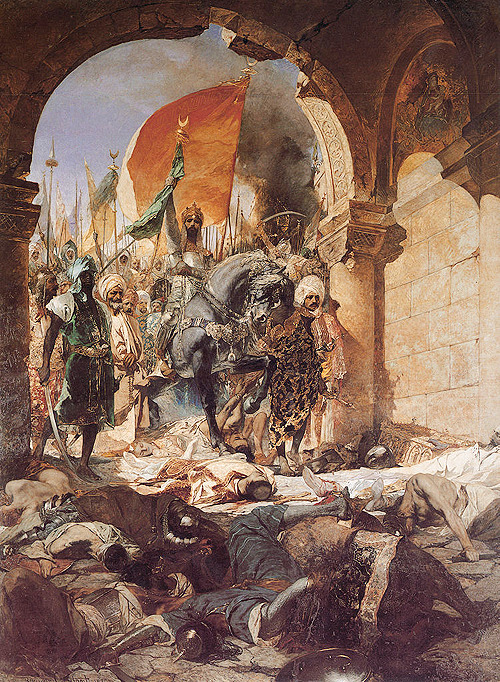

May 29, 1453: Constantinople is captured by Ottoman forces.
On this day in 1453, the great Byzantine capital, founded by its namesake Constantine the Great over a millennium earlier, fell to the Ottoman Empire, whose forces were led by a twenty-one year old sultan Mehmed II, later called Mehmed the Conqueror for his successful military campaigns (his successful siege of Constantinople was one of his earliest as sultan).
Constantinople had only completely fallen to enemy forces thrice in its over 1,000-year-long history, thanks in part to the complex system of fortifications and walls that had been primarily built in the fourth and fifth centuries but were continuously restored and added to throughout the city’s history. Two of these successful conquests took place in the 13th century, in 1204 and 1261; the former was a vicious sack by crusaders, and the latter a reclamation by Greek rulers, who attempted to restore this once powerful center of trade, culture, and religion to its former glory. By the time the Ottomans launched their final siege on Constantinople in early April of 1453, what was left of the Eastern Roman Empire amounted to Constantinople, a small portion of northwestern Turkey, and the Peloponnese;the Ottoman Empire now possessed most of Asia Minor and the Balkans, areas that surrounded Constantinople on both sides.
In Constantinople, the defending army was hopelessly outnumbered. Around 7,000 were left to fight off between 50,000 and 80,000 Ottoman attackers and their guns, which blasted through the city’s famous walls. The final successful assault on May 29 ended in the death of Constantine XI, last Byzantine emperor, and in the death of the Byzantine Empire, which outlasted its Western counterpart by nearly 1,000 years; after three days of plunder, the Ottoman conqueror entered the city. The sultan converted Justinian’s Hagia Sophia into a mosque, though he also appointed for the Greek Orthodox Church a new Patriarch. Despite the importance of Constantinople to Christendom, no serious attempts were made (although they were suggested) in subsequent years to recapture the city, and its successful capture by the Ottomans is regarded by many historians as one of the key events marking the end of the Middle Ages. Scholars bearing classical texts fled to Italy, initiating a cultural exchange that helped launch the Renaissance; in addition, the rising power of the Ottoman Empire posed a significant threat to Europeans, and its dominating presence in Asia Minor cut off Europe’s land link to Asia.